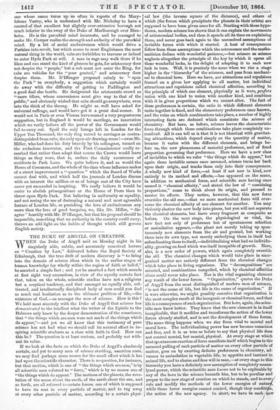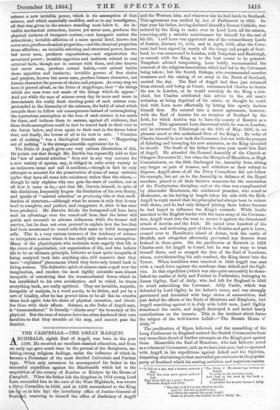• THE DUKE OF ARGYLL ON CREATION.
'WHEN the Duke of Argyll said on Monday night in his TT singularly able, subtle, and accurately conceived lecture on "Creation by Law," delivered before the Royal Society of 'Edinburgh, that the true drift of modern discovery is "to bring into the domain of science ideas which in the earlier stages of human knowledge lay wholly within the region of faith or belief," he asserted a simple fact ; and yet he asserted a fact which sounds at first sight very anomalous, in view of the equally certain fact that, taken on the whole, scientific studies have not a religious but a sceptical tendency, and that amongst no equally able, cul- tivated, and intellectually disciplined body of men could you find so much real hesitation as to the ultimate problem of life,—the existence of God,—as amongst the men of science. How is this? We hold most sincerely with the Duke of Argyll that science has demonstrated to the intellect what the writer of the Epistle to the• Hebrews only knew by the deeper demonstration of the conscience, that "the things which are seen were not made of the things which do appear,"—and yet we all know that this testimony of pure science has not had what we should call its natural effect in in- spiring scientific students as a claw with faith in God. How can this be? The question is at least curious, and probably not with- out its value.
If we look at the facts on which the Duke of Argyll's absolutely certain, and yet to many men of science startling, assertion rests, we may find perhaps some reason for the small effect which it has had upon the scientific character. There is no question, for instance, but that motion, which is one of "the things which are seen," is by all scientific men referred to "force," which is by no means one of "the things which do appear." The motions of the planets, the revo- lution of the moon about the earth, of the earth about the sun, and so forth, are all referred to certain forces, one of which is supposed to have its seat in every particle of matter, and to tug away at every other particle of matter, according to a certain physi- cal law (the inverse square of the distance), and others of which (the forces which precipitate the planets in their orbits) are supposed to have been given once for all. Starting with these hypo- theses, modern science has shown that it can explain the movements of astronomical bodies, and then it spends all its time on explaining them, and never goes back again to the unresolved assumptions of invisible forces with which it started. A host of consequences follow from these assumptions which the astronomer and the mathe- matician deduce with wonderful patience,—but science as science neglects altogether the principle of the key by which it opens all these wonderful locks, in the delight of adapting it to each new lock in turn. Well, it is precisely the same when we rises stage higher in the "hierarchy" of the sciences, and pass from mechani- cal to chemical laws. Here we have, not attractions and repulsions framed on a given law applying to all matter, but individual attractions and repulsions called chemical affinities, according to the principle of which one element, physically as it were, prefers union with one kind to union with another kind, and combines with it in given proportions which we cannot alter. The fact of these preferences is certain, the ratio in which different elements unite together is fixed, and the elementary preferences once known, and the rules on which combinations take place, a number of highly interesting facts are deduced which constitute the science of chemistry. But here, as before, science leaves the characteristic force through which these combinations take place completely un- resolved. All it can tell us is that it is not identical with gravitat- ing attractions, which depend simply on the quantity of matter, because it varies with the different elements, and brings be- fore us. the new phenomena of material preference, and of fixed proportion governing that preference. Here we have a new class of invisibles to which we refer "the things which do appear," but again these invisible causes once assumed, science turns her back upon their origin, and tracks them only into their consequences. A wholly new kind of force,—at least if not new in kind, new entirely in its method and effects,—has appeared on the scene, in addition to mechanical force, and scientific men having once named it "chemical affinity," and stated the law of "combining proportions," cease to think about its origin, and proceed to master its effects. They notice, however, that this new force overrides the old one,—that no mere mechanical force will over- come the chemical affinity of one element for another. You may violently shatter the new body into pieces, but you will not separate the chemical elements, but leave every fragment as composite as before. On the next stage, the physiological or vital, the new fact not only of preference but of spontaneous selection or assimilation appears,—the plant not merely taking up spon- taneously new elements from the air and ground, but working them into its own type, not merely embodying them in itself but subordinating them to itself,—individualizing what had no individu- ality, growing on food which was itself incapable of growth. Here, also, is a new order of powers, which again completely override the old. The chemical changes which would take place in unor- ganized matter are entirely different from the chemical changes which take place in living organisms. The " decompositions " are arrested, and combinations compelled, which by chemical affinities alone could never take place. Nor is the vital organizing element any result of the dower forces. "Organization," quotes the Duke of Argyll from the most distinguished of modern men of science, "is not the cause of life, but life is the cause of organization." If it were otherwise, we might possibly conceive that organization is the most complex result of the inorganic or chemical forces, and that life is a consequence of such organization. But here, again, the scien- tific men know better. They know that the new element is in itself inexplicable, that it modifies and transforms the action of the lower forces already studied, and is not the development of those forces. The same thing happens when we rise from vital to mental and moral laws. The individualizing power has now become conscious and free, and it is as true as before to say that physical life does not control mental, but mental, physical. At every stage at which that spontaneous exertion of force manifests itself which begins in the assumed pulling of each particle of matter on every other particle of matter, goes on by exerting definite preferences in chemistry, ad- vances to assimilation in vegetable life, to appetite and instinct in animal life, and to choice and free will in man, —at every stage in this hierarchy you have a definitely new assumption of completely unana- lyzed power, which the scientific man knows not to be explicable by any of the laws in the science beneath him, but to be peculiar and proper to the new stage of creation on which he stands, and to over-,/
i rule and modify the methods of the lower energies of natur while those lower energies cannot control, though they conditi n, the action of the new agency. In short, we have in each Itew I
science a new invisible power, which is the assumption of that science, and which materially modifies, and so to say transfigures, all that was given in the science standing next below it. An in- visible mechanical attraction, known yet never seen, produces the physical motions of inorganic matter,—not inorganic matter the attractions ; invisible affinities of a more special kind, known but never seen, produce chemical propertiwi—not the chemical properties those affinities ; an invisible selecting and structural power, known but never seen, produces organization,—not organization the structural power ; invisible appetites and instincts related to real external facts, though not in contact with them, and also known but never seen, produce animal habits,—not animal habits those appetites and instincts; invisible powers of free choice and purpose, known but never seen, produce human character, not human character the powers of choice and purpose. At every step we have it proved afresh, as the Duke of Argyll says, that "the things which are seen were not made of the things which do appear." And yet while the men of science every day do more and more to -demonstrate the really fresh starting-point of each science com- prehended in the hierarchy of the sciences, the habit of mind which compels them to follow out consequences instead of contemplating the mysterious assumption at the base of each science is too much for them, and induces them to assume, against all evidence, that these fresh assumptions could in fact be traced back to their root in the forces below, and then again to their root in the forces below that, and finally, the lowest of all to its root in zero. "Creation out of nothing" was a theological formula once. "Happening out of nothing" is the strange scientific equivalent for it.
The Duke of Argyll gives one very curious illustration of this. He points out that though Mr. Darwin has repeatedly told us that his "law of natural selection" does not in any way account for a new variety of species, nay, is obliged to refer every variety to an unknown cause and call it accident,—though in fact he only attempts to account for the preservation of some of many varieties (after they have all come into existence) rather than the others, — though he only explains why one gets the start of another, not at all how it came to be,—yet that Mr. Darwin himself, in spite of this disclaimer, frequently forgets the limitation of his own theory, and speaks of "natural selection" as producing this or that modi- fication of stracture,—although what he means is only that it may tend to complete, and perfect, and exaggerate it, after it has once been produced. Mr. Darwin thinks the hexagonal-cell bees have such an advantage over the round-cell bees, that the latter will perish and succumb to adverse influences, while the former will survive, but he does not even pretend to explain how the bee that had been accustomed to round cells first came to build hexagonal cells. This is a very curious instance of the tendency of science to interpolate a cause where it has really only made an assumption. Many of the physiologists who maintain most eagerly that life is the cause of organization, not organization of life, and who believe life to be an ultimate principle, hitherto at least quite incapable of being analyzed back into anything else, still conceive that they have "explained" phenomena which they have only traced back to living sources. The deductive spirit of science casts a spell over the imagination, and renders the most rigidly scientific man almost incapable of conceiving that the transcendental forces which he has established to his own satisfaction, and to which he traces everything back, are really spiritual. They are invisible, majestic, incapable of analysis, in a word worthy to be divine, and yet by a sort of fatality, after he has proved them to be all this he absorbs them back again into his chain of physical causation, and identi- fies them with their effects. Science, as the Duke of Argyll-says, is "transcendental." It literally" climbs over" the boundary of the physical. But the men of science have too often deadened their own faculties so that they stumble at the step, and cannot pass the frontier.































 Previous page
Previous page